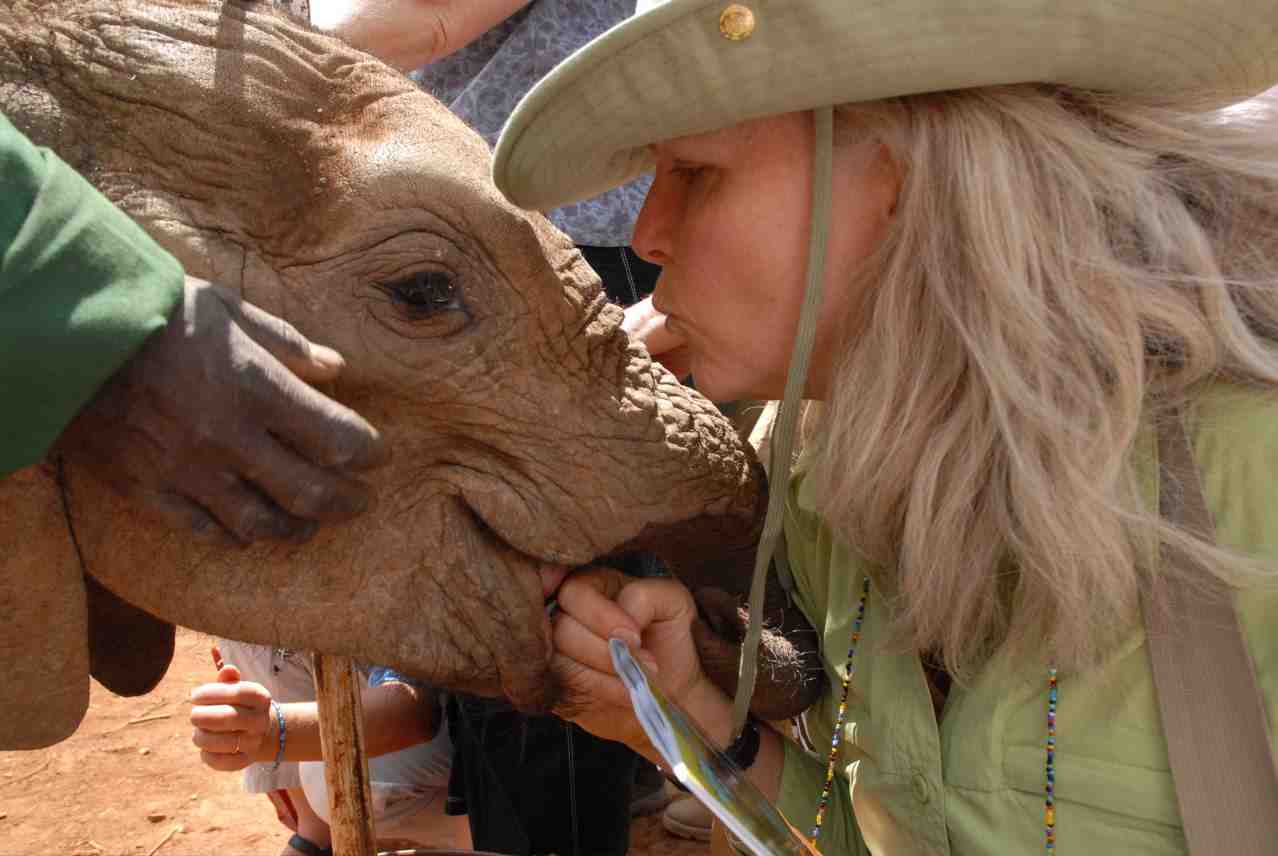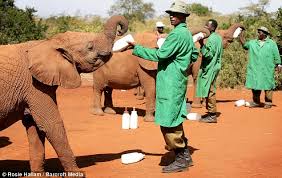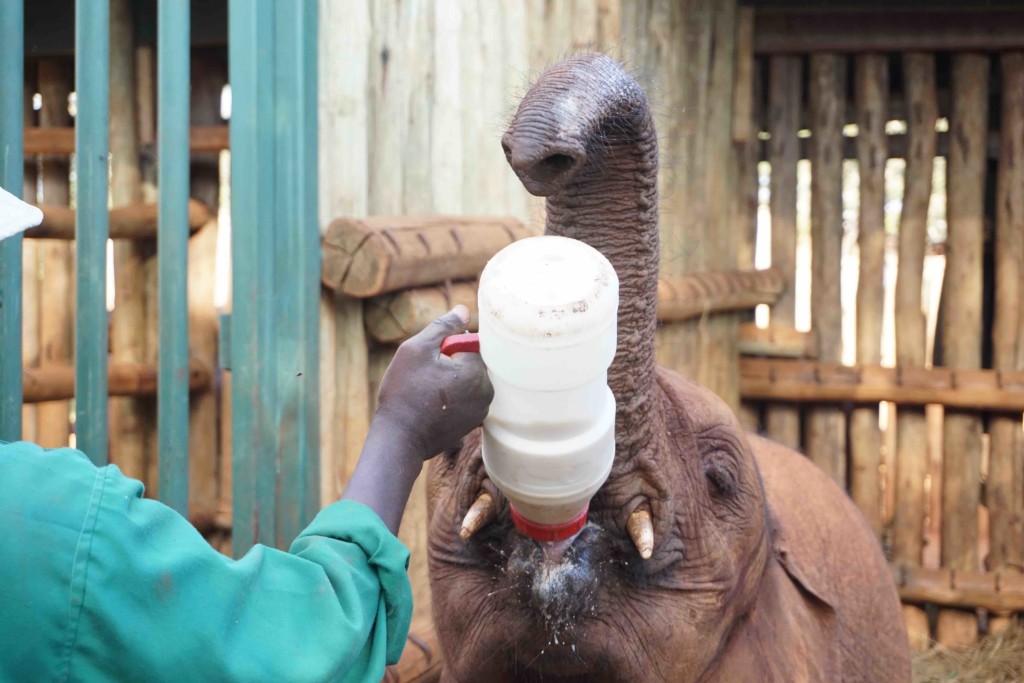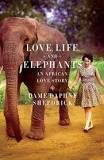
I’ve heard Daphne Sheldrick, the world’s expert on raising orphaned baby elephants, say on many occasions that “Elephants are like us…but better.”
Growing up I only knew elephants from reading Babar The Elephant books, and going to zoos. Later I would see my first wild elephants in Africa.
But it was while visiting the David Sheldrick Wildlife Trust on the edge of Nairobi’s National Park in Kenya that my love affair with the world’s largest land mammal really began in earnest.
Today I am back at the Sheldrick center for my fifth or sixth visit. I can’t get enough of the place, and make a point of visiting whenever I am passing through Nairobi, as I am today, on my way to lead co-lead a safari in Tanzania with author Tina Welling.
I’m waiting among a crowd of people, including about 100 local school children who have never before seen an elephant. We are gathered around a roped off mud hole.
Out of the woods walk local African men dressed in blue-green coveralls followed by a line of elephants the color of the red earth we are standing on. Some of the animals run kicking a ball, some lag behind, others play with the one in fronts tail.
Their excitement is palpable; their energy contagious and…adorable. The ellies have come to play, wallow in the mud, and take their mid-morning feeding of the milk solution Daphne Sheldrick perfected over years of trail and error.
If the Sheldrick Center had volunteer positions I would sign up immediately. I envy the keepers who hand feed the elephants from gallon sized “baby” bottles, and at night sleep in the stalls with the baby elephants who need almost constant contact until the age of three.
I listen to the keepers tell each baby elephants story of tragedy that brought them here to the orphanage. This one fell down a well and was so dehydrated when she was rescued. That one over there watched its whole family being poached and was found vigilantly standing beside her dead mothers body. This little one is still so fragile she wears a blanket to keep her warm even though it’s 80 degrees today.
Each story is as heartbreaking as the next.
Daphne Sheldrick believes in Re-Wilding
But there is a happy ending for most of the 200 elephants that have been brought here over the years. Daphne says, “There is a saying: If you love an animal, set it free, and if it loves you, it will come back to you to thank you from time to time.” She says she has found that to be very true.
After five years at the orphanage (or when they are deemed ready) the young elephants are transferred to holding areas in Tsavo National Park where they will eventually walk back to the freedom that is their right as a wild elephant. On many occasions the “re-wilded” elephants will return to the this place of transition to say Hi to a keeper, or ask for help when they have a festering wound for instance. They never forget the caregivers that saved their lives.
In September I am leading an elephant conservation focused safari and we will visit both the orphanage and the stockades in Tsavo to witness the elephants pilgrimage back to the wild. It will be a magical and transformative experience.
Join me for intimate encounters with these highly sensitive, emotional and loyal beings and learn why Daphne Sheldrick says humans have much we need to emulate about elephants. Or foster an orphan elephant on their journey back to the wild.
Meanwhile if you haven’t yet read Daphne Sheldrick’s memoir, you are in for a treat.
11 Replies to “Daphne Sheldrick says, “Elephants are like us, but better.””
Comments are closed.





Love this article!
It was such a pleasure meeting you at the DSWT, brief as it may have been! What a great article! 😀 I apologize for not being able to send you my photos before you posted this, but please feel free to see them (and others) at: http://www.bit.ly/wildlifebycheppy
I first heard about her work through Elefriends. I adopted the “E” family led by the matriarch ECHO. Saw a documentary concerning the drought & how the elephants were suffering. Then my wonderful Echo passed away. I cried for hours.
I would love to go there and someday I will make it there. I am so glad they are re entered back into the wild. I hope they are protected. I am so happy for the babies even though they have had a life of tragedy.
Yes it is a great program for the babies who have watched their mothers be poached. So sad but with a happy ending. Thanks for sharing your thoughts.
I know how much it can effect us when an animal we have gotten to know and love dies. Heart wrenching. I think you are talking about the work of the wonderful Cynthia Moss who is the researcher in Amboseli. She is just as amazing as Daphne Sheldrick but with a different focus. We will be visiting both of these incredible women on the Elephant Focused Safari I am leading in September.
Thanks Emma and I hope we stay in touch. Have a great rest of your time in Kenya. I will be back in September leading an elephant focused safari.
Thanks Janey. And since you have been there with me you can picture it. Thanks for commenting.
My safari to Kenya/Tanzania in 2014 of course exceeded my expectations. I needed to be reminded by others to lower my voice when there was an animal sighting. It wasn’t easy to hide the exhilaration I felt. I went to the elephant orphanage also. It was magical. One of the premies was so small it didn’t reach the trainer’s knee. It had lotion on its ears to prevent sunburn. Watching the yearlings play in their mud puddle was so funny. They pushed each other in the pit like it was a game. I am flooded with amazing memories as I write.
Sharon
the ellies dont wear a blanket because of cold ! for the most little and fragiles it’s because of the hard african sun can burn their fragile baby skin. When they are with their mothers in the wild they are protect by keeping themselves out of the “killing” african sun under their mother’s bellies. Next time ask the keepers they will confirm it to you.
I am in tears at work as I read this. I have dreamed of going to Africa since I was a child and have found out in the last 3 days that it’s finally going to happen. I am going to this place. It’s the first morning of my trip! I can’t hold back tears I am so excited. Thank you for giving me just a glimpse of what it will be like.